15 Best AI Tools for Authors 2026: Book Writing, Editing & Marketing

Quick Answer: Best AI Book Writer & Editing Tools 2026
What is the best AI for book writing?
The best AI book writer depends on your specific needs:
- Best AI for fiction writing: Sudowrite (creative storytelling) or NovelAI (long-form narrative)
- Best AI for text editing: ProWritingAid (deep manuscript analysis) or Grammarly (grammar & style)
- Best AI for book publishing & marketing: ManuscriptReport.com (complete marketing automation)
- Best free AI for authors: Hemingway Editor (readability), Effidit (editing), Rytr (marketing copy)
Top 3 Overall Picks:
- ManuscriptReport.com ($40-$149) - Complete book marketing in 10 minutes
- Sudowrite ($10-$100/mo) - AI co-writer for fiction authors
- ProWritingAid ($120/year) - Story editing AI with 20+ reports
This guide reviews 15 AI tools for authors across writing, editing, and marketing. We've tested each platform to help you find the right tools for your workflow—from drafting your manuscript to launching your book.
AI tools fall into three categories:
- Writing Tools: Generate ideas and draft content (Sudowrite, NovelAI)
- Editing Tools: Polish grammar and style (ProWritingAid, Grammarly)
- Marketing Tools: Create promotional materials (ManuscriptReport.com, Jasper)
Most successful authors use tools from each category at different stages. Let's dive into the top 15.
1. ManuscriptReport.com: Your All-in-One AI Book Marketing Toolkit
Topping our list of the best AI tools for authors is ManuscriptReport.com, an exceptionally powerful and comprehensive platform designed to transform a finished manuscript into a complete, market-ready package. It stands out by consolidating dozens of complex marketing tasks into a single, automated workflow, generating a professional-grade marketing report in under ten minutes. This tool is an absolute game-changer for authors who want to bypass the steep learning curve and high costs of book marketing.
Instead of piecing together blurbs, keywords, and audience profiles from various sources, ManuscriptReport.com analyzes your entire manuscript to produce a cohesive and data-driven marketing strategy. This holistic approach ensures every asset, from ad copy to Amazon categories, is perfectly aligned with your book's unique voice, themes, and target market.
Why It's Our Top Pick
ManuscriptReport.com earns its place as the featured choice for its sheer breadth of features and immediate, actionable value. It effectively replaces the need for expensive marketing consultants by delivering agency-level insights and assets at a fraction of the cost. The platform automates over 15 distinct marketing functions, saving authors an estimated 30+ hours of manual research and copywriting per book.
Its sophisticated AI excels at identifying nuanced literary elements, such as themes, tropes, and character arcs, and translating them into compelling marketing copy. This ensures the output feels human-crafted and authentic, a critical factor for connecting with readers. For indie authors, small presses, or literary agents, it’s a revolutionary tool for scaling marketing efforts efficiently.
Key Insight: The platform's ability to generate a complete "Book Bible" is invaluable. It provides a central document for maintaining consistency across a series or coordinating with marketing teams, editors, and cover designers.
Key Features & Use Cases
- Comprehensive Marketing Reports: Upload your manuscript and receive a detailed PDF covering everything from blurbs, synopses, and taglines to KDP keywords, BISAC categories, and comparative title analysis.
- Target Audience Personas: Get a clear breakdown of your ideal reader, including their motivations, interests, and where to find them online, allowing for hyper-targeted advertising.
- Content Generation: Beyond the report, it creates ready-to-use marketing content, including a series of blog posts based on your book's themes and approximately 20 social media posts complete with relevant imagery. Learn more about auto-generating book blurbs with AI.
- Publisher & Agency Tools: Offers monthly subscriptions with volume discounts and white-label reports, enabling seamless integration into professional publishing workflows.
Pricing
ManuscriptReport.com offers flexible pricing options based on your needs:
- Metadata Essentials: $40 - Launch-ready metadata including blurb, genres, keywords, 5 comparable titles
- Full Marketing Report (Most Popular): $69 (save $30) - Everything in Essentials PLUS 20 marketing assets including audience personas, marketing plan, ad copy, and more
- Complete Author Toolkit: $149 (save $107) - Everything in Full Report PLUS 20 social media posts with images, 6-10 blog posts, and book bible
- For Publishers & Agencies: Custom monthly subscriptions with volume discounts and white-labeling options
Pros & Cons
| Pros | Cons |
|---|---|
| All-in-One Solution: Delivers a vast array of marketing assets from a single manuscript upload. | Per-Report Cost: The pay-per-report model for authors could become costly for prolific writers. |
| Time & Cost Savings: Automates tasks that would take 30+ hours or cost over $500 with a consultant. | Lacks Personal Consultation: While highly advanced, it doesn't replace bespoke human strategy sessions. |
| High-Quality Output: AI generates human-like, accurate, and ready-to-use marketing copy. | |
| Data Privacy: Your manuscript is secure, never used for AI training, and deleted after 30 days. |
The Verdict
For any author or publisher seeking to streamline their marketing process without sacrificing quality, ManuscriptReport.com is an indispensable asset. It provides the most comprehensive, automated marketing toolkit on the market, making it the definitive choice for turning a great book into a commercial success.
2. Sudowrite
Sudowrite stands out as a premier AI writing partner specifically crafted for fiction authors. Unlike generalist AI writers, its features are honed to assist with the art of storytelling, making it one of the best AI tools for authors aiming to enhance their creative process rather than just automate text generation. It excels at acting as a collaborative brainstormer, helping you break through writer's block and explore new narrative avenues.
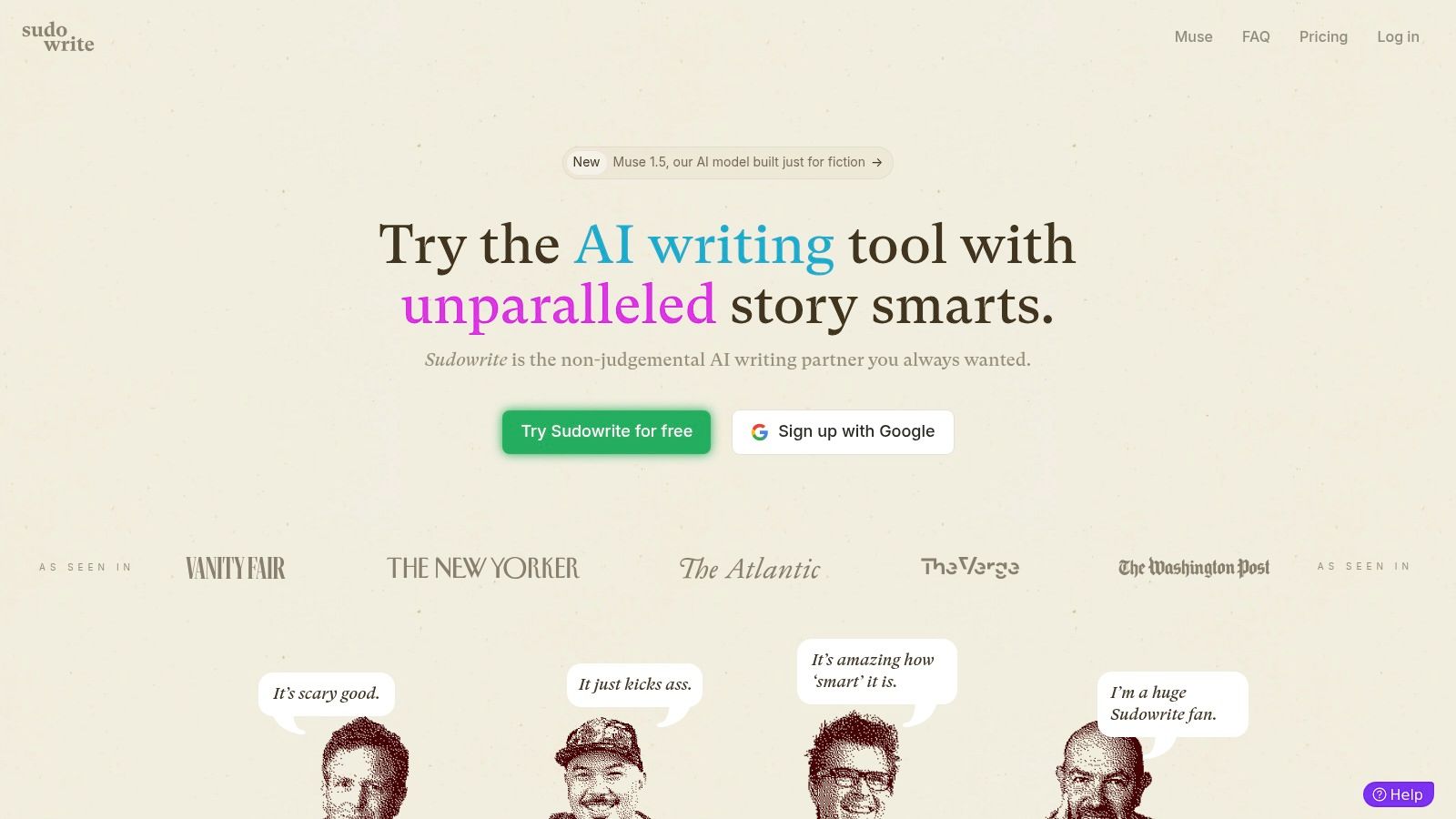
The platform's user-friendly interface guides you through its powerful toolset. You can highlight a sentence and use the "Describe" tool to add rich, sensory details, or employ the "Twist" feature to generate unexpected plot points. For those just starting, the "Brainstorm" function is a goldmine for character names, world-building concepts, and plot ideas.
Key Features & Use Cases
- Brainstorming Partner: Use it to generate lists of character traits, plot ideas, or magical systems.
- Descriptive Writing: The "Describe" feature enriches your prose by adding sensory details based on sight, sound, smell, and touch.
- Plot Development: The "Twist" and "Write" features can suggest new directions for your story or expand on existing scenes.
Sudowrite operates on a subscription model with tiered pricing based on word credits, starting from the "Hobby & Student" plan up to a "Max" plan. While it offers a free trial, continued use requires a paid subscription, and it is currently limited to English. For a deeper dive into how it compares, you can learn more about Sudowrite and similar tools.
Website: https://www.sudowrite.com/
3. Grammarly
While not a storytelling generator, Grammarly is an indispensable AI tool for authors focused on polishing their final manuscript. It functions as a powerful writing assistant that goes far beyond a standard spell checker, providing real-time feedback on grammar, punctuation, style, and clarity. For authors, this means catching subtle errors and refining prose to ensure a professional and readable final product.
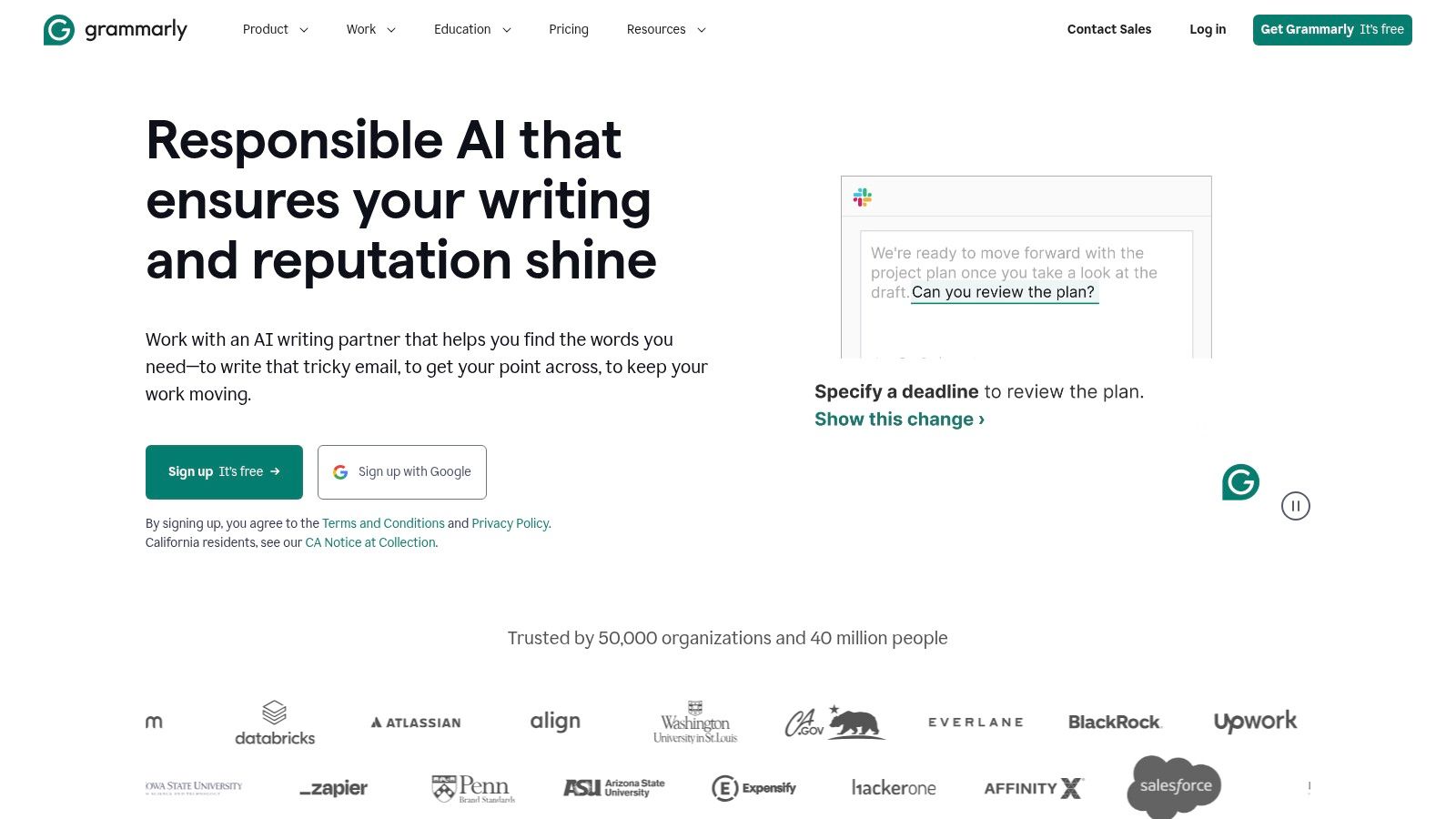
Its strength lies in its widespread integration. Grammarly works directly within Microsoft Word, Google Docs, and web browsers, allowing authors to edit in their preferred writing environment. The platform’s user-friendly suggestions are easy to accept or dismiss, making the editing process efficient. Its tone detector is also a useful feature for ensuring character dialogue and narration align with the intended mood.
Subscribe & Get Your Free Marketing Plan Template
Receive regular updates on marketing best-practices, AI shortcuts, and get our proven 4-phase marketing roadmap for free.
Unsubscribe anytime.
Key Features & Use Cases
- Manuscript Polishing: Use the grammar, spelling, and punctuation checks to clean up your draft before sending it to an editor.
- Style and Tone Consistency: The tone detector helps maintain a consistent voice throughout your manuscript.
- Plagiarism Check: The premium version includes a plagiarism detector to ensure your work is entirely original.
Grammarly offers a robust free version that covers basic grammar and spelling. For more advanced features like the tone detector, style guides, and plagiarism checker, a Premium or Business subscription is required. While it's excellent for technical correctness, it may not always grasp nuanced creative or stylistic choices, requiring author discretion.
Website: https://www.grammarly.com/
4. ProWritingAid
ProWritingAid goes beyond simple grammar correction, positioning itself as a comprehensive AI-powered writing mentor and style editor. It’s one of the best AI tools for authors in the revision stage, offering a suite of over 20 detailed reports that analyze everything from pacing and dialogue to sentence structure and readability. This depth makes it invaluable for polishing a manuscript and strengthening prose, ensuring the final draft is clean, consistent, and engaging for readers.
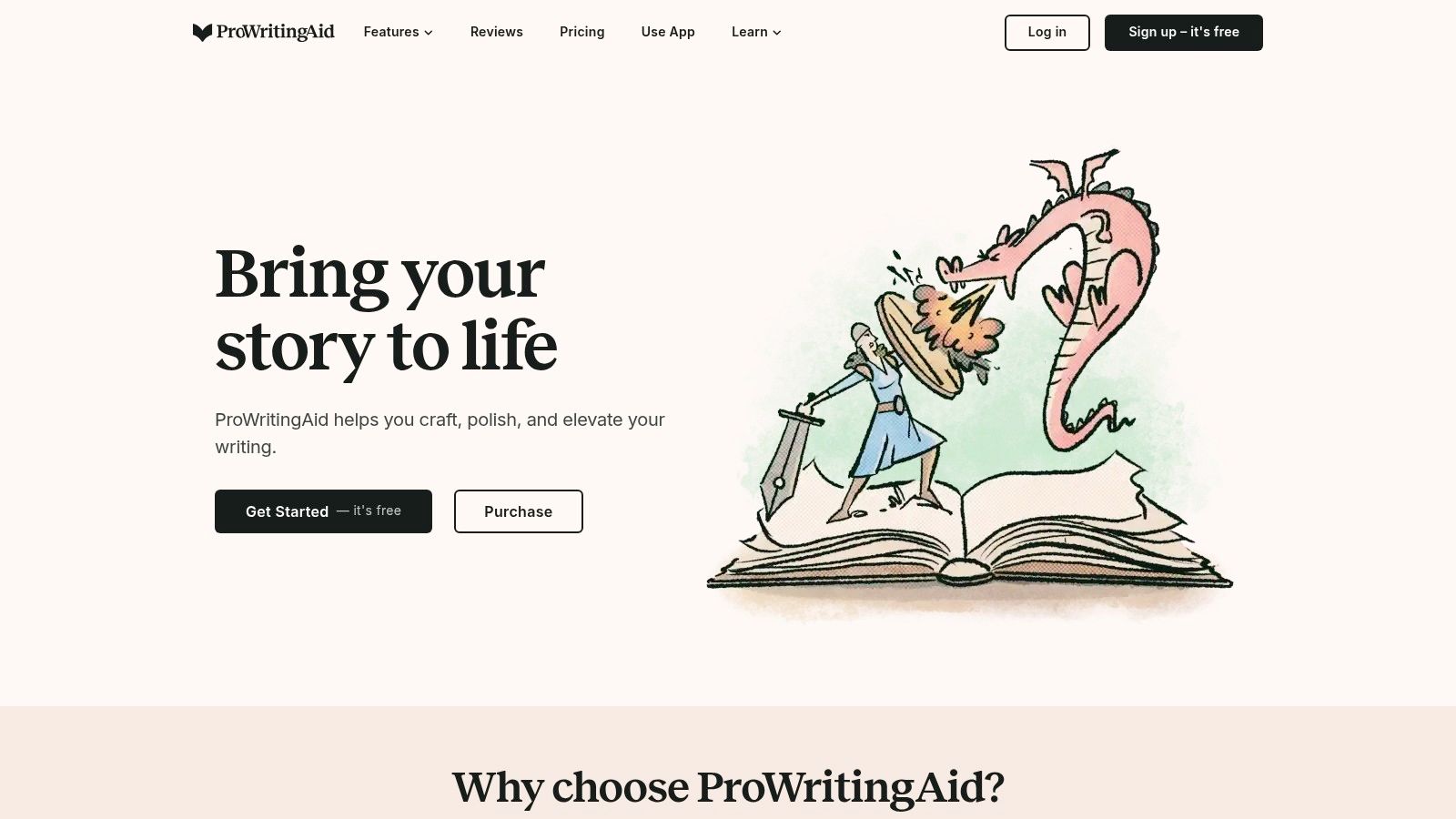
The platform integrates seamlessly with popular writing software like Scrivener, Google Docs, and Microsoft Word, allowing you to edit directly within your preferred environment. While the sheer number of reports can feel overwhelming initially, they provide unparalleled insights into your writing habits. For instance, the "Pacing" report can help identify slow-moving chapters, while the "Sensory" report highlights opportunities to add more vivid detail.
Key Features & Use Cases
- Deep Manuscript Analysis: Generate detailed reports on pacing, readability, sentence length variation, and overused words to refine your draft.
- Style and Grammar Editing: Correct grammar, spelling, and punctuation errors while receiving suggestions to improve overall writing style and eliminate clichés.
- Seamless Integration: Use the tool directly within your writing software of choice, including Scrivener and Word, for a streamlined editing workflow.
ProWritingAid offers a free version with limitations, alongside a premium subscription available monthly, yearly, or as a lifetime one-time purchase. The premium tier unlocks all reports and integrations. While the web editor can be slow with very large documents, its detailed feedback and flexible purchasing options make it a top-tier choice for serious authors.
Website: https://prowritingaid.com/
5. Jasper (formerly Jarvis)
While many AI tools for authors focus on fiction, Jasper (formerly Jarvis) carves out its niche by excelling at the business side of being a writer: marketing and promotion. It's a powerful AI content generator designed to help authors expand their online presence. Instead of aiding with plot twists, Jasper assists with creating compelling book descriptions, author bios, blog posts, and social media updates that capture audience attention.

The platform offers a vast library of templates tailored for different marketing needs. Its clean interface makes it easy to generate content quickly, and its integration with Surfer SEO is particularly useful for authors aiming to rank their blogs or websites. While it supports numerous languages, its output always benefits from a human touch to ensure it aligns perfectly with your authorial brand and voice.
Key Features & Use Cases
- Marketing Copy: Generate persuasive book descriptions, ad copy, and email newsletters to engage readers.
- Content Creation: Quickly draft blog posts and articles related to your book's themes to build an audience.
- SEO Optimization: Use the Surfer SEO integration to optimize your web content for better search engine visibility.
Jasper operates on a subscription model with various tiers, which can be an investment for authors on a tight budget. However, for those focused on building a robust author platform, it is one of the best AI tools for authors looking to master their marketing. You can explore how it fits into a larger strategy by checking out our complete guide to AI book marketing.
Website: https://www.jasper.ai/
6. Copy.ai
While not exclusively for fiction, Copy.ai earns its spot as one of the best AI tools for authors due to its powerful marketing and promotional capabilities. It excels at generating high-quality copy for everything an author needs post-writing, from compelling book descriptions and author bios to engaging social media posts and email newsletters. This makes it an invaluable asset for building an author platform and connecting with readers.
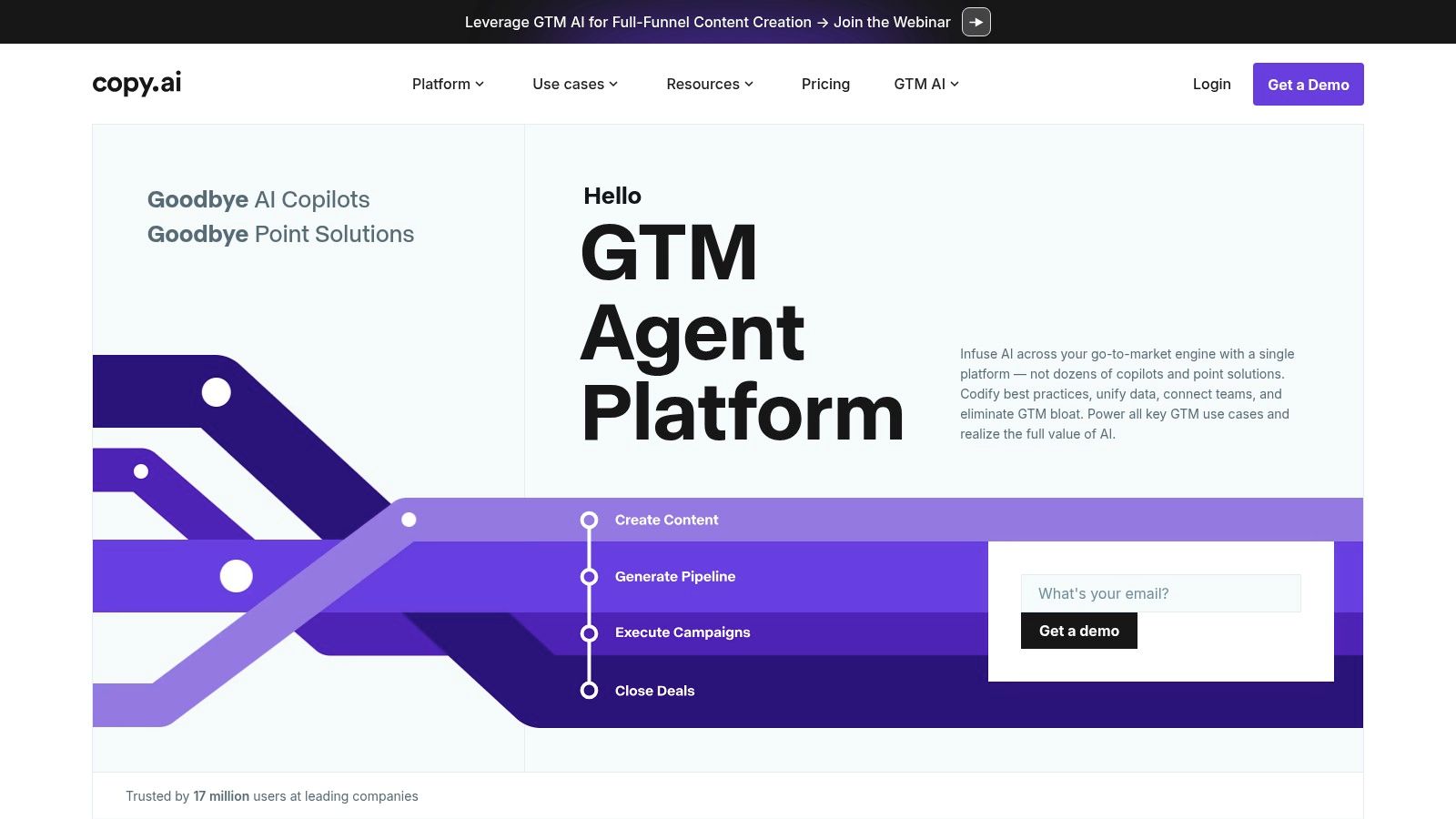
The platform is built around a vast library of pre-made templates designed for specific marketing tasks. Its user-friendly interface allows you to select a template, input key details about your book or brand, and adjust the tone to match your authorial voice. The generated content often requires minimal editing, saving significant time on marketing efforts so you can focus more on writing your next book.
Key Features & Use Cases
- Book Descriptions: Quickly generate enticing blurbs for your book's sales page on platforms like Amazon or Goodreads.
- Social Media Content: Create a batch of promotional posts for platforms like X, Facebook, and Instagram to announce a book launch or share updates.
- Author Bio Crafting: Use the templates to write a professional author bio in various lengths for your website, social profiles, and press kits.
Copy.ai offers a generous free plan with a word credit limit, which is perfect for authors with lighter marketing needs. For more extensive use, paid plans offer unlimited words and advanced features. Though primarily a marketing tool, its versatility makes it a must-have for the business-savvy author.
Website: https://www.copy.ai/
7. Writesonic
Writesonic positions itself as a powerful AI writing assistant designed primarily for creating marketing and SEO-optimized content with remarkable speed. While not exclusively for novelists, it is one of the best AI tools for authors who need to manage their platform, write compelling book descriptions, or create promotional materials. It helps bridge the gap between writing the manuscript and marketing it effectively, handling tasks that many authors find challenging or time-consuming.
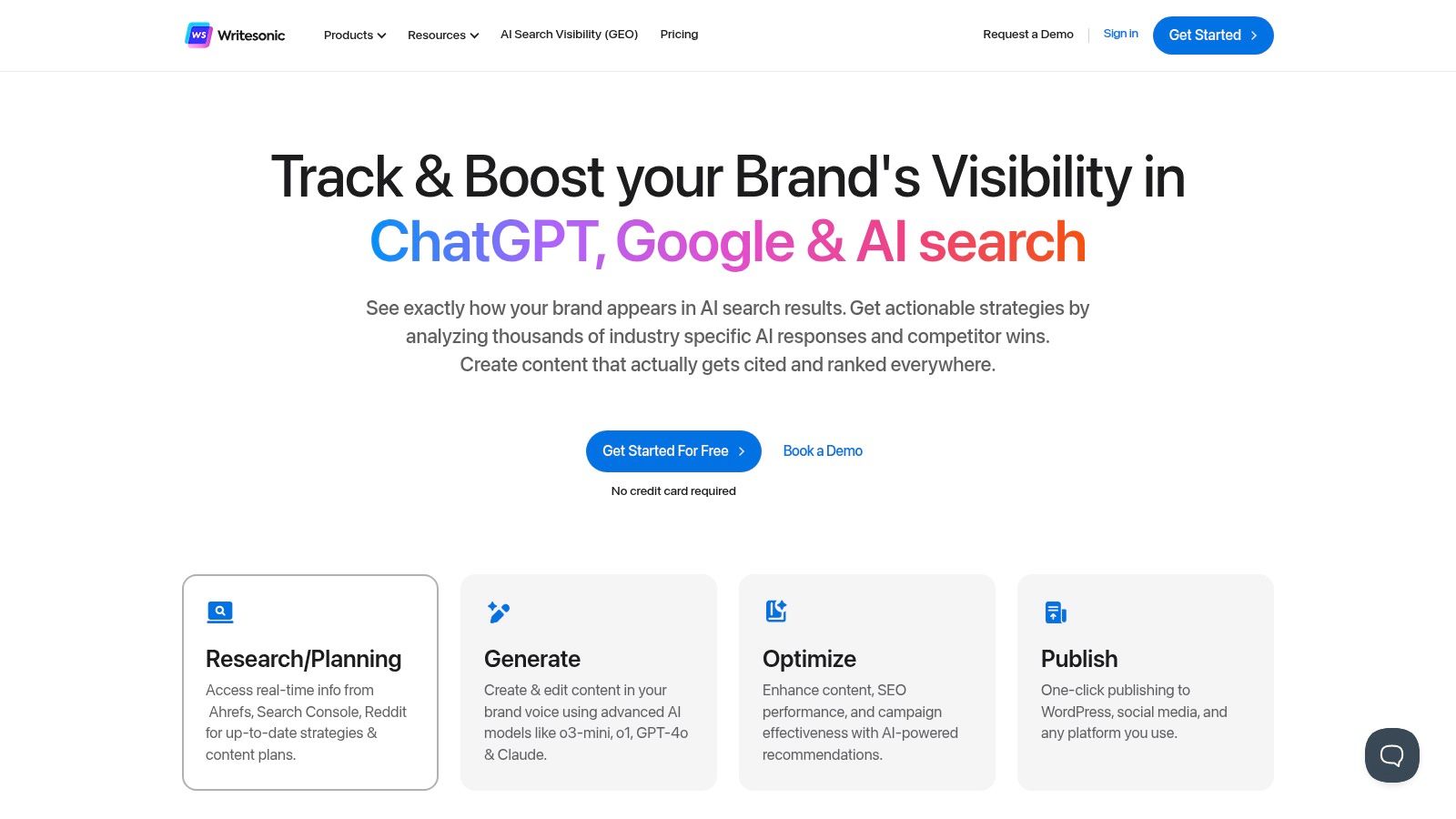
The platform is built for efficiency, allowing authors to generate everything from blog posts about their writing journey to catchy social media ad copy. Its interface is straightforward, offering templates for specific content types. This makes it easy to produce a first draft of a book blurb, an author bio, or even an Amazon product description with just a few prompts, saving significant time on marketing efforts.
Key Features & Use Cases
- AI Article & Blog Writer: Quickly draft blog posts to build an author platform or engage with readers.
- Ad & Social Media Copy: Generate compelling copy for Facebook, Instagram, or Google ads to promote a new book launch.
- Landing Page Generator: Create a simple, effective landing page for a book presale or an author newsletter sign-up.
Writesonic offers a free trial with a limited word count. Paid plans range from a "Small Team" plan to custom "Enterprise" solutions, with pricing based on word count and feature access. While its output is fast, the generated content often requires manual refinement to capture a specific authorial voice, and some advanced features are restricted to higher-tier plans.
Website: https://writesonic.com/
8. Wordtune
Wordtune is an AI-powered writing companion that focuses on refining your prose at the sentence level. While many tools generate new content, Wordtune excels at helping authors polish what they have already written, making it one of the best AI tools for authors dedicated to improving clarity, tone, and style. It functions as an advanced thesaurus and grammar checker, offering multiple rephrasing options for any highlighted text.

The platform integrates directly into your web browser and various writing platforms, providing real-time suggestions as you type. This seamless integration allows you to adjust the tone of a sentence to be more formal or casual, shorten or expand upon an idea, and ensure your word choices are precise and impactful without leaving your document.
Key Features & Use Cases
- Sentence Rephrasing: Highlight any sentence to receive multiple alternative versions, helping you find the perfect phrasing.
- Tone Adjustments: Easily switch between professional, casual, and other tones to match your narrative voice or character dialogue.
- Browser Integration: Use Wordtune directly in Google Docs, Gmail, and other web-based editors for a smooth workflow.
Wordtune offers a generous free version with a limited number of "rewrites" per day. For more extensive use, it provides paid subscription plans that unlock unlimited suggestions and advanced features. Its strength lies in its simplicity and focus on refinement, though it lacks the broader story-generation capabilities of other platforms.
Website: https://www.wordtune.com/
9. NovelAI
NovelAI is an AI-assisted storytelling platform that prioritizes author privacy and creative freedom. It is particularly known for its strong performance in generating long-form narrative content, allowing authors to guide the AI with their own writing style. This focus on emulating and adapting to a user's prose makes it one of the best AI tools for authors who want a co-writer that maintains their unique voice.

The platform offers a secure, cloud-based environment where all stories are encrypted, ensuring your work remains confidential. Users can fine-tune the AI's output by providing examples of their writing or by choosing from pre-set modules inspired by famous authors. This customization gives writers granular control over the tone, style, and direction of the generated text.
Key Features & Use Cases
- Story Generation: Use it to continue a story from a prompt, flesh out a scene, or generate new chapters based on the existing text.
- Customizable AI: Train the AI on specific writing styles to create a consistent narrative voice throughout your manuscript.
- Secure Writing: Write with peace of mind knowing your creative work is stored privately and securely.
NovelAI offers a free trial with limited functionality and text generation. Full access requires a subscription, with tiered plans based on memory size and generation priority. While it excels in creative writing, its current support is limited to the English language.
Website: https://novelai.net/
10. Authorea
Authorea carves out a specific niche, positioning itself as an essential collaborative writing tool for academic and technical authors. While not a generative AI in the same vein as storytelling assistants, it leverages smart technology to streamline the complex process of scholarly writing, from drafting and citing to formatting and publishing. Its strength lies in creating a unified environment where co-authors can work together in real time, making it one of the best AI tools for authors in research fields.
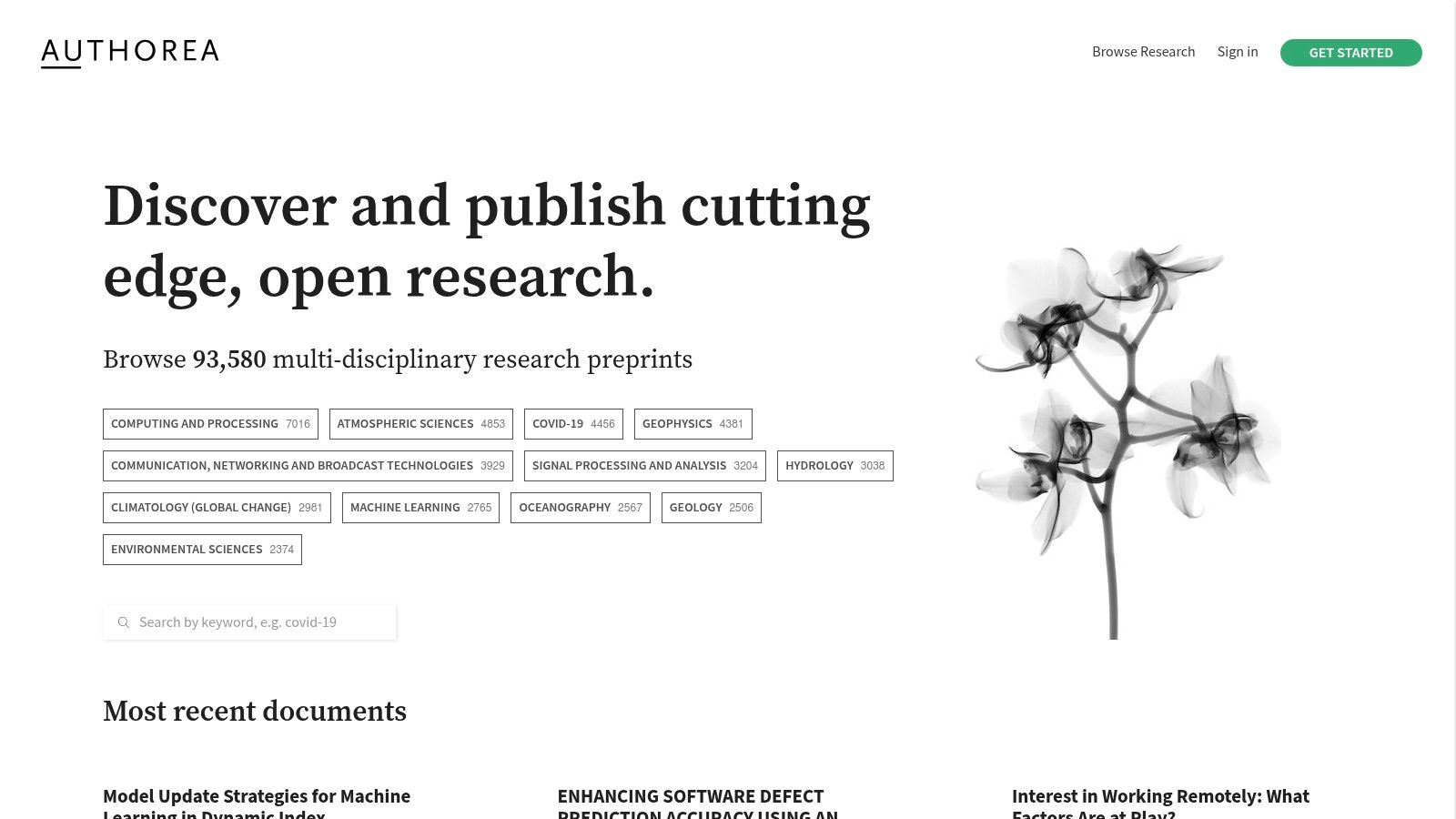
The platform is built to handle the rigorous demands of academic papers, supporting complex elements like equations, figures, and data directly within the document. It automates one of the most tedious tasks for researchers: citation and bibliography management. The interface allows writers to choose from thousands of journal styles, and the platform automatically formats citations and references accordingly, saving countless hours.
Key Features & Use Cases
- Academic Formatting: Ideal for writing research papers, theses, and technical reports where specific journal citation styles (like APA, MLA, Chicago) are required.
- Collaborative Writing: Multiple authors can edit a single document simultaneously, with changes tracked and synced for everyone.
- Rich Content Support: Easily integrate dynamic figures, data, and equations using formats like LaTeX and Markdown.
Authorea operates on a freemium model. The free plan offers unlimited public documents but limits users to one private document. Paid plans, starting with the "Standard" tier, provide more private documents and advanced features. While powerful for its intended audience, its academic focus and support for formats like LaTeX may present a learning curve for fiction authors.
Website: https://www.authorea.com/
11. Sassbook
Sassbook positions itself as a versatile AI writing assistant designed to support a wide range of content creation needs, from fiction to articles. Its strength lies in its simplicity and accessibility, offering a straightforward suite of tools that can help authors overcome writer's block and generate initial drafts quickly. It is particularly useful for authors who need to produce supplementary content, like blog posts or summaries, alongside their main manuscript.
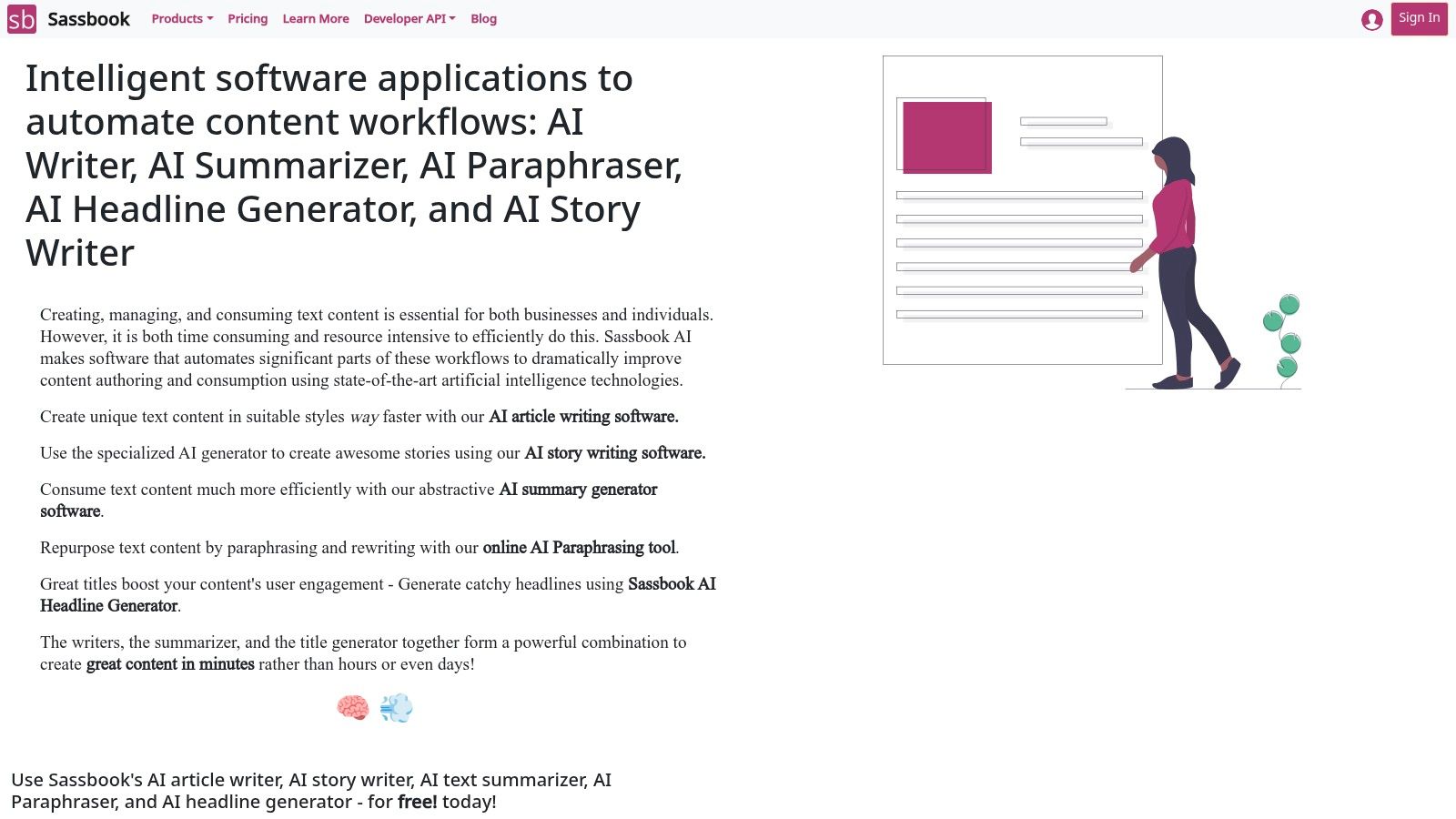
The platform is built around a user-friendly interface that prioritizes speed. You can input a simple prompt, and the AI will generate text that can be used as a starting point for a scene, a chapter, or an entire story. While the output may require editing for flow and coherence, it serves as an effective tool for getting words on the page and exploring different creative directions without pressure.
Key Features & Use Cases
- AI Text Generator: Provide a few sentences to generate longer-form content, ideal for drafting scenes or creating story outlines.
- Summarization Tool: Quickly condense long passages of text or chapter notes into concise summaries for easy review.
- Genre Versatility: Use the tool to experiment with different writing styles, from fiction and storytelling to more formal article writing for author blogs.
Sassbook offers a generous free plan, making it one of the most accessible AI tools for authors to try without commitment. For more advanced features and higher generation limits, it provides paid subscription tiers. A key limitation is that free-tier outputs can sometimes lack the narrative depth of more specialized fiction tools, but its regular updates show a commitment to improvement.
Website: https://sassbook.com/
12. Effidit
Effidit is a powerful, free AI writing assistant designed to help authors enhance their text quality and writing efficiency. Developed by Tencent AI Lab, it distinguishes itself by offering a suite of intelligent tools that focus on refining existing text rather than generating it from scratch. This makes it one of the best AI tools for authors who prioritize precision and polish in their final drafts, acting as an advanced proofreader and style editor.
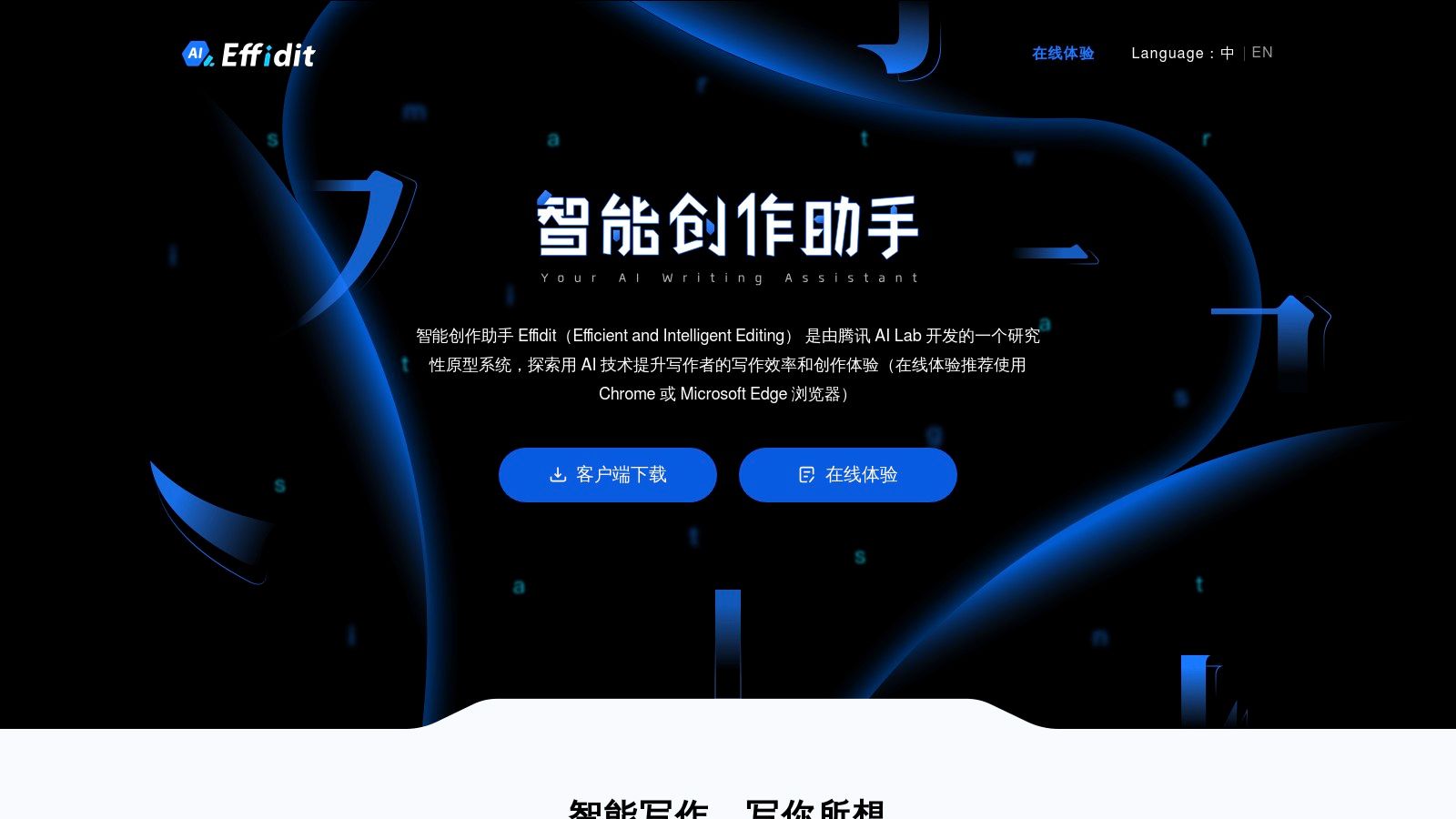
The platform offers a clean interface where you can paste your text and access its core functions. Its standout features include robust sentence completion, academic-level error checking, and text polishing to improve clarity and flow. For authors working in multiple languages, Effidit’s support for both English and Chinese is a significant advantage, providing versatile editing assistance across different linguistic contexts.
Key Features & Use Cases
- Sentence Completion: Provides intelligent suggestions to complete your sentences, helping overcome minor writer's block and speed up drafting.
- Error Checking: Scans text for grammatical errors, spelling mistakes, and awkward phrasing with high accuracy.
- Text Polishing: Recommends alternative wording and sentence structures to make your writing more concise, formal, or impactful.
Effidit is completely free to use, making it an accessible option for any author. While its feature set is more focused on editing than creative generation, its utility in the revision process is undeniable. To understand how such tools fit into a broader editing workflow, you can master AI for book editing with this ultimate guide.
Website: https://effidit.qq.com/
13. Rytr
Among the more accessible AI tools for authors, Rytr excels as a versatile and budget-friendly assistant for all the writing that surrounds your book. It's designed for authors who need to quickly generate high-quality copy for marketing materials, social media, and brainstorming without a steep learning curve or significant financial investment. Its straightforward interface helps writers produce everything from email newsletters to ad headlines in minutes.
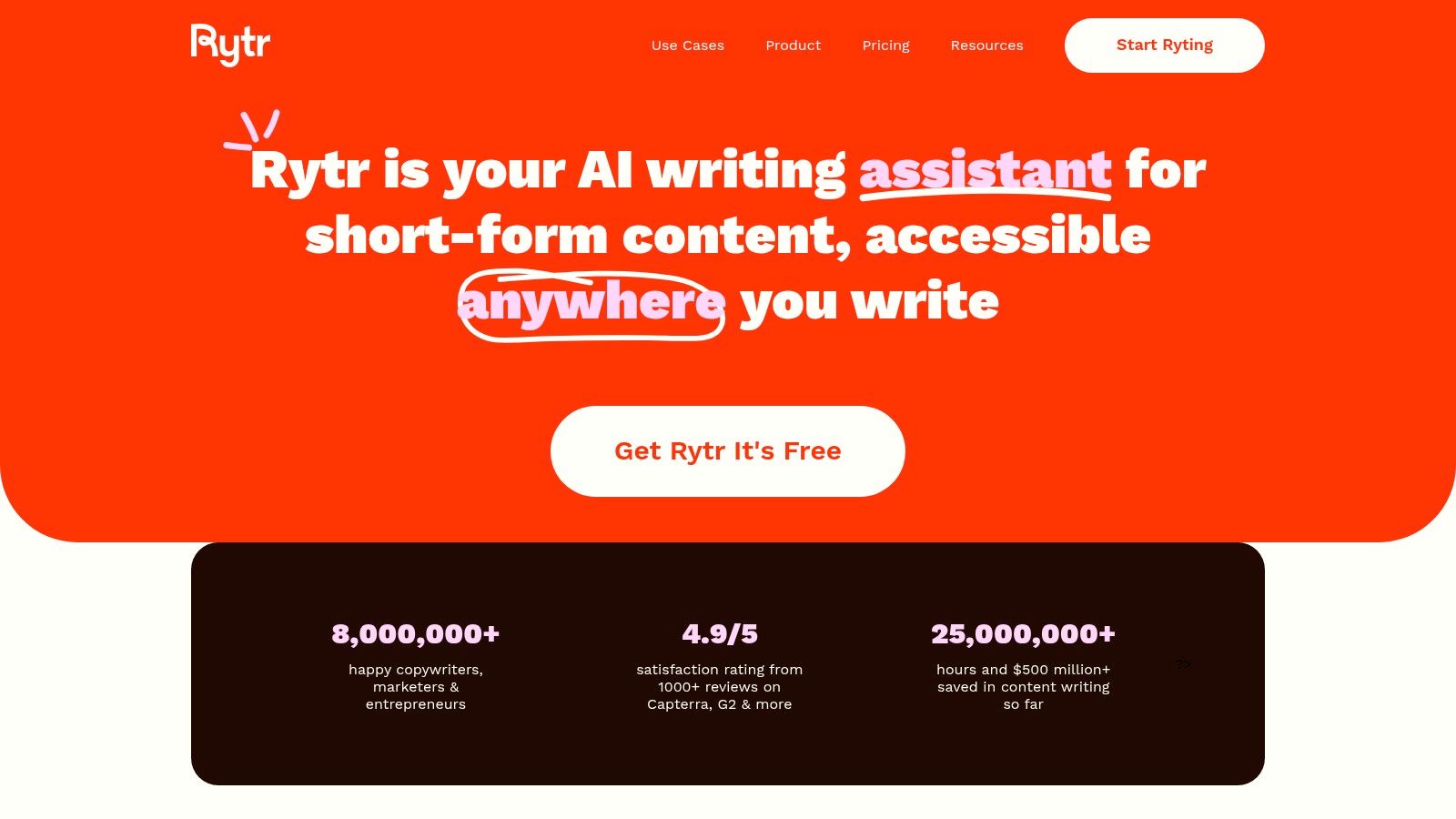
Key Features & Use Cases
- 40+ Content Templates: Generate blog post outlines, YouTube video descriptions, and social media captions with simple prompts.
- Tone Selection: Choose from over 20 different tones (convincing, inspirational, casual) to match your author brand and book genre.
- Multi-Language Support: Create content in over 30 languages to reach global audiences.
- Built-in Plagiarism Checker: Ensure originality in all your promotional content and supplementary materials.
Rytr offers one of the most generous free plans in the AI writing space, making it perfect for authors testing AI tools for the first time. Premium plans unlock unlimited generation and advanced features at very competitive prices. While the output may need some refinement for your unique voice, it's excellent for overcoming promotional writer's block and generating initial drafts quickly.
Website: https://rytr.me/
14. Hemingway Editor
While many AI tools for authors focus on content generation, Hemingway Editor carves out a specialized niche by concentrating purely on style and readability. It acts as a digital style guide, pushing writers to make their prose more direct, clear, and impactful without losing their unique voice. This tool is invaluable during the self-editing phase when you want to tighten sentences, eliminate unnecessary complexity, and ensure your manuscript is accessible to your target audience.
Key Features & Use Cases
- Readability Analysis: Get instant feedback on your text's grade level to ensure it matches your intended audience (YA, general fiction, academic, etc.).
- Style Improvements: Identify hard-to-read sentences (highlighted in yellow and red), passive voice usage, and excessive adverbs.
- Sentence Structure: Receive suggestions for simpler word alternatives and more direct phrasing without losing meaning.
- Visual Feedback: Color-coded highlighting makes it easy to spot problem areas at a glance.
The platform offers a free web version for quick checks and an affordable desktop app for more extensive editing sessions. It's particularly useful for fiction authors who want to improve pacing and readability, and non-fiction writers ensuring complex ideas are presented clearly. However, it's important to use its suggestions judiciously—blindly following all recommendations can strip away your unique narrative voice.
Website: https://hemingwayapp.com/
15. AI Dungeon
Rounding out our list of AI tools for authors is AI Dungeon, a unique platform that transforms the writing process into an interactive, game-like experience. Rather than functioning as a traditional writing assistant, it operates as a collaborative storytelling partner, generating dynamic narratives in real-time based on your inputs. This makes it exceptional for creative exploration, breaking through writer's block, and discovering unexpected plot directions.
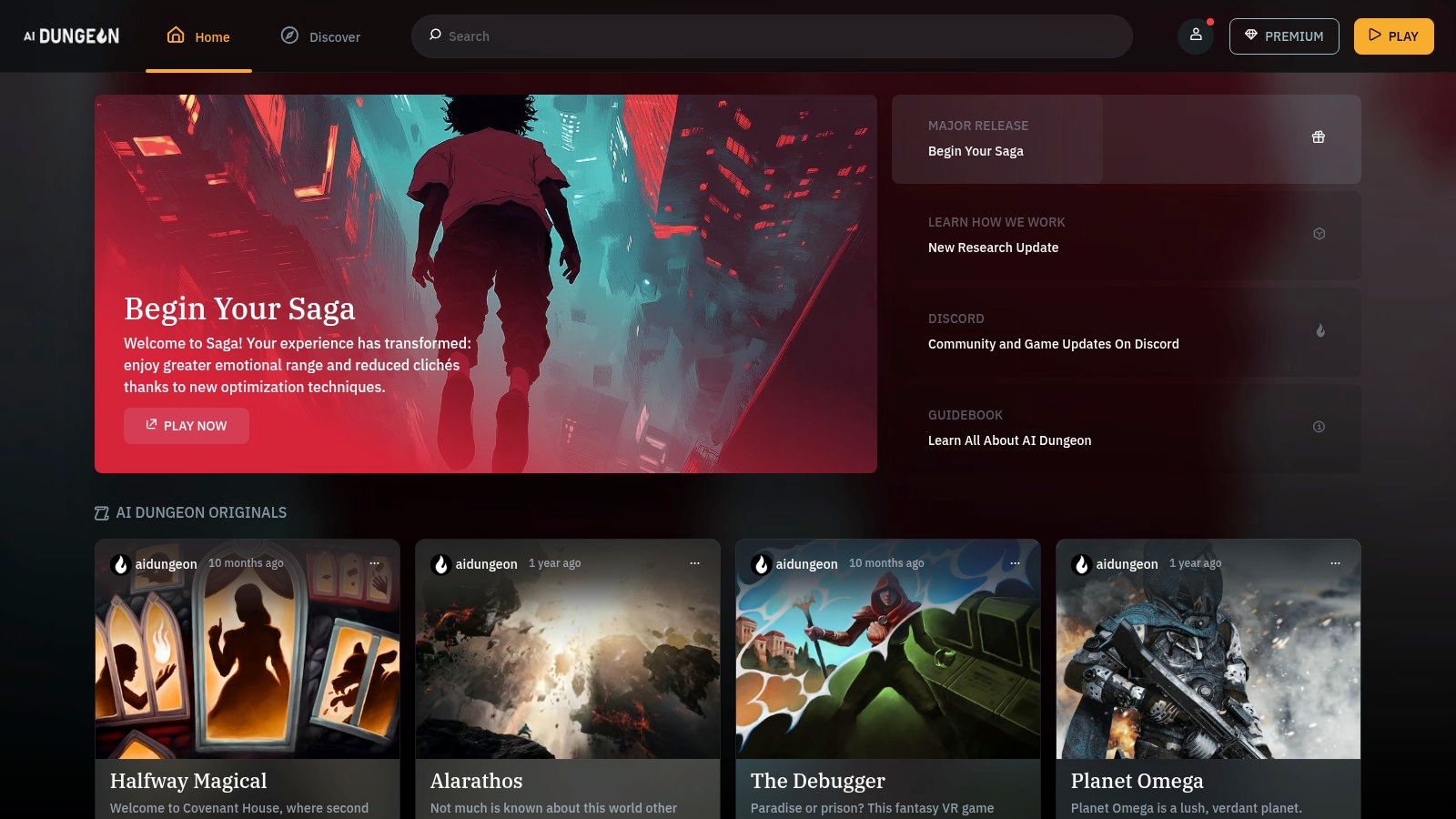
Key Features & Use Cases
- Interactive Story Generation: Type any action and watch the AI continue your narrative, perfect for exploring "what if" scenarios.
- Genre Flexibility: Drop your characters into fantasy quests, sci-fi adventures, mystery scenarios, or any setting you can imagine.
- Character Development: Test how your protagonists might react in different situations without committing to writing full scenes.
- Multiplayer Mode: Collaborate with co-authors or writing partners in shared storytelling sessions.
AI Dungeon offers a generous free tier that provides substantial functionality for experimentation. Premium subscriptions unlock faster generation, longer memory, and advanced customization options. While it's more of a creative playground than a production writing tool, it's invaluable for brainstorming, warming up your creative muscles, and exploring narrative possibilities in a low-pressure environment.
Website: https://play.aidungeon.io/
Comprehensive AI Writing Tools Feature Comparison
| Tool | Best For 🎯 | Core Features ✨ | Price 💰 | Ideal User Type 👥 |
|---|---|---|---|---|
| 🏆 ManuscriptReport.com | Best for book publishing & marketing | Complete marketing automation, blurbs, ads, blog posts | $40-$149 one-time | Authors ready to launch |
| Sudowrite | Best AI for fiction writing | Story brainstorming, plot development, creative descriptions | $10-$100/mo | Fiction novelists |
| Grammarly | Best AI for grammar & style editing | Real-time grammar, tone, style suggestions across platforms | Free-$30/mo | All writers |
| ProWritingAid | Best story editing AI | 20+ manuscript analysis reports, pacing, readability | $120/year or $399 lifetime | Fiction & non-fiction authors |
| Jasper | Best AI for book marketing copy | Marketing templates, SEO content, blog posts | $39-$125/mo | Marketing-focused authors |
| Copy.ai | Best AI for promotional content | Book descriptions, social media posts, author bios | Free-$49/mo | Self-published authors |
| Writesonic | Best AI for blog writing | Blog articles, landing pages, ad copy | Free-$20/mo | Platform-building authors |
| Wordtune | Best AI for sentence-level editing | Rephrasing, tone adjustments, clarity improvements | Free-$25/mo | Authors polishing final drafts |
| NovelAI | Best AI book writer for long-form fiction | Story continuation, style customization, privacy | $10-$25/mo | Creative fiction writers |
| Authorea | Best AI for academic writing | Collaborative editing, citations, LaTeX formatting | Free-$12/mo | Researchers, academic authors |
| Sassbook | Best budget AI for writing | Text generation, summarization, multi-genre | Free-$29/mo | Budget-conscious writers |
| Effidit | Best free AI text editor | Error checking, text polishing, multilingual | Free | International authors |
| Rytr | Best AI for beginners | 40+ templates, simple interface, affordable | Free-$29/mo | First-time AI users |
| Hemingway Editor | Best AI for readability | Grade-level analysis, passive voice detection | Free-$20 one-time | Authors improving clarity |
| AI Dungeon | Best AI for creative brainstorming | Interactive storytelling, plot exploration | Free-$30/mo | Writers with creative blocks |
What Makes This the Ultimate AI Tools Guide for Authors?
This comprehensive resource stands apart from other AI tool roundups because it's built specifically for authors' unique needs. We've tested each platform extensively, focusing on real-world applications rather than generic features. Our evaluation criteria include:
- Author-Specific Use Cases: How each tool integrates into the complete publishing workflow
- Quality vs. Speed Trade-offs: Honest assessments of output quality and time savings
- Budget Considerations: Clear pricing information and value propositions for different author budgets
- Integration Capabilities: How tools work together and fit into existing writing processes
Quick Reference: Best AI Tools by Author Type
Fiction Authors:
- Primary: Sudowrite (creative assistance) + Grammarly (editing) + ManuscriptReport.com (marketing)
- Budget Alternative: NovelAI + Hemingway Editor + Rytr
Non-Fiction Authors:
- Primary: Jasper (content creation) + ProWritingAid (editing) + ManuscriptReport.com (marketing)
- Academic Focus: Authorea + Effidit + Grammarly
Self-Published Authors:
- Essential Stack: ManuscriptReport.com + Grammarly + Copy.ai
- Advanced: Add Sudowrite/Jasper + ProWritingAid
First-Time Authors:
- Starter Kit: Grammarly (free) + Rytr (free plan) + Hemingway Editor (free web version)
- When ready to invest: Add ManuscriptReport.com
Choosing Your AI Co-Pilot: Final Thoughts on the Future of Writing
Navigating the landscape of AI-powered writing assistants can feel overwhelming, but the journey is well worth the effort. The tools we've explored, from comprehensive editing suites like ProWritingAid to creative engines like Sudowrite, all share a common goal: to augment, not automate, the author’s unique craft. The era of the solitary writer is evolving into one of strategic collaboration, where technology handles the tedious and frees you to focus on the art of storytelling.
The most critical takeaway is that there is no single "best" tool for every author. The right choice hinges entirely on your specific needs, your current workflow, and the stage of your writing project. Adopting these technologies is not about replacing your voice; it's about amplifying your efficiency and creative reach.
How to Choose Your Ideal AI Partner
Selecting the right tool requires a strategic self-assessment. To help you make an informed decision, consider these key factors:
- Primary Goal: Are you focused on first-draft generation, deep structural editing, or post-writing marketing? A tool like ManuscriptReport.com is built for marketing and sales analysis, while Jasper excels at generating marketing copy, and a tool like Grammarly focuses on refining prose. Define your main objective first.
- Creative vs. Technical: Do you need a muse or a mechanic? For brainstorming and overcoming writer’s block, creative partners like Sudowrite or NovelAI are invaluable. For polishing grammar, style, and structure, technical editors like ProWritingAid or Effidit provide the necessary precision.
- Workflow Integration: How will this tool fit into your existing process? Consider tools that offer browser extensions, API access, or integrations with software you already use, such as Scrivener or Microsoft Word. A seamless fit reduces friction and encourages consistent use.
- Budget and Scalability: Evaluate the pricing models. Many tools offer robust free tiers perfect for testing, while subscription plans unlock advanced features for power users. Start small, test the functionality, and only commit once you've confirmed its value to your specific process.
Implementing AI for Maximum Impact
Once you’ve chosen a tool, a thoughtful implementation is crucial. Avoid the temptation to overhaul your entire process overnight. Instead, integrate your new AI co-pilot incrementally. Start by using it for a single, specific task, such as refining a chapter's dialogue or generating a book description.
Remember that these are assistive technologies. Always maintain your critical oversight. AI suggestions are just that: suggestions. Your intuition, experience, and unique authorial voice remain the final arbiters of what makes it onto the page. By viewing these powerful platforms as specialized assistants, you can harness their capabilities to become a more efficient, informed, and empowered author. The future of writing is a powerful partnership between human creativity and artificial intelligence, and it is here to help you succeed.
Ready to transform your manuscript into a powerful marketing asset? For authors seeking to bridge the gap between a finished book and a successful launch, ManuscriptReport.com offers the most comprehensive, data-driven solution. Generate an automated, in-depth market analysis, discover your ideal target audience, and create professional sales materials in minutes at ManuscriptReport.com.
Enjoyed this article? Subscribe for more + get a free marketing roadmap template.
Receive regular updates on marketing best-practices, AI shortcuts, and get our proven 4-phase marketing roadmap template for free.
Unsubscribe anytime.